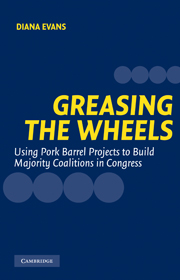Book contents
- Frontmatter
- Contents
- List of Tables and Figures
- Acknowledgments
- 1 Introduction
- 2 Pork Barrel Politics and General Interest Legislation
- 3 Who Calls the Shots? The Allocation of Pork Barrel Projects
- 4 Highway Demonstration Projects and Voting on the Federal Highway Program
- 5 Presidential Bargaining with Congress: The NAFTA Bazaar
- 6 Pork Barreling in the Senate: Do Both Parties Do It?
- 7 Conclusions
- References
- Index
4 - Highway Demonstration Projects and Voting on the Federal Highway Program
Published online by Cambridge University Press: 18 November 2009
- Frontmatter
- Contents
- List of Tables and Figures
- Acknowledgments
- 1 Introduction
- 2 Pork Barrel Politics and General Interest Legislation
- 3 Who Calls the Shots? The Allocation of Pork Barrel Projects
- 4 Highway Demonstration Projects and Voting on the Federal Highway Program
- 5 Presidential Bargaining with Congress: The NAFTA Bazaar
- 6 Pork Barreling in the Senate: Do Both Parties Do It?
- 7 Conclusions
- References
- Index
Summary
The previous chapter examined how Public Works and Transportation Committee leaders distributed highway demonstration projects, with a focus on which members they targeted with projects in their efforts to influence those members' votes later, when the highway bills came to the floor of the House. In statistical terms, the dependent variable was project awards to members. We established that leaders distributed projects strategically in an effort to secure the votes not only of rank-and-file members, but also members whose support would be especially valuable: their own committee members and other leaders.
This chapter assesses the effectiveness of leaders' attempts to influence members with pork barrel benefits. It addresses the following questions: Did members who received projects then respond as the leaders hoped, voting to support the leaders' positions? Did the leaders who used this strategy succeed in undermining the cohesion of the opposing party? This chapter answers those questions for highway demonstration projects. Chapter 5 answers them for the president's efforts to get congressional approval of NAFTA in the House; and Chapter 6 examines the Senate's use of appropriations earmarks to win votes for Appropriations subcommittee chairs' versions of particular appropriations bills. In all of those analyses, the dependent variable is the member's roll call vote.
While it seems obvious that project recipients would vote for final passage of a bill that provides them with benefits, controversial legislation must typically overcome numerous obstacles before the final vote.
- Type
- Chapter
- Information
- Greasing the WheelsUsing Pork Barrel Projects to Build Majority Coalitions in Congress, pp. 90 - 130Publisher: Cambridge University PressPrint publication year: 2004



